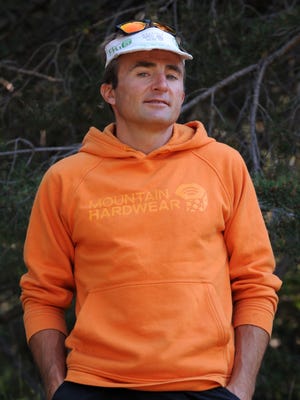'Swiss Machine' climber dies near Mount Everest

Legendary Swiss mountaineer Ueli Steck, who built a global reputation for unrelenting speed scaling the world's highest peaks, died Sunday in an apparent fall in Nepal, his family said.
"Ueli Steck was killed while trying to climb Mount Everest and the Lhotse," the family said on his Facebook page, adding that the exact circumstances of his death were not immediately known.
Steck, 40, held several records for solo and speed climbing. He twice won the Piolet d'Or — Golden Ice Axe — a prestigious international mountaineering award. His accomplishments won him the moniker "Swiss Machine."
"As soon as there are reliable findings on the causes of Uelis Steck's death, the media will be informed," the statement said. "The family asks the media for understanding that they will not provide any further information at the time."
Steck and Tenzing Sherpa were preparing to climb Mount Everest by the difficult and dangerous West Ridge/Hornbein Couloir route, The Himalayan Times reported. The duo also hoped to climb Lhotse, world's fourth tallest mountain. The website said Steck was preparing his body to high altitude climbing when he apparently fell.
More on Everest:
Think you're tough? This guy climbed Everest in shorts
The Mount Everest-climbing Snapchatters are going back
A group of six rescuers found his body, saying he could have slipped and fell on an ice-covered slope. Fellow mountaineers had seen him climbing Mount Nuptse alone a short time earlier, the Times said.
In 2008, he climbed the north face of the 13,000-foot Eiger in a record 2 hours, 47 minutes. That broke his own record for the Alpine climb by more than an hour. In 2015, Steck completed his 82 Summit project, climbing all 82 Alpine peaks above 4,000 meters, or about 2.5 miles. It took him just 62 days.
Steck sounded confident about his latest plan in a Facebook entry posted Wednesday.
"Quick Day from Basecamp up to 7000m and back," Steck said. "I love it. It's such a great place here. I still believe in active acclimatization. This is way more effective then spending nights up in the Altitude!"
His death was the first of the spring mountaineering season. It cut short what could have been an epic climb.
“The Hornbein route has never been repeated since 1963, so this is already quite a challenge," he said in a recent video. "Everything has been climbed once, but the whole linkup hasn't been done."
He said he felt great, that his body felt stronger than ever before. But he acknowledged that his climbing plan was a difficult one, that success was not assured.
"I will not make a definition of success," he said. "I think that is wrong. ... The only definition (for not) being successful is if you have an accident and you are going to die."
